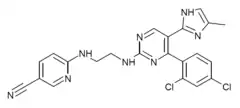CHIR99021
 | |
| Names | |
|---|---|
| IUPAC name
6-((2-((4-(2,4-Dichlorophenyl)-5-(4-methyl-1H-imidazol-2-yl)pyrimidin-2-yl)amino)ethyl)amino)nicotinonitrile | |
| Identifiers | |
CAS Number |
|
3D model (JSmol) |
|
| ECHA InfoCard | 100.236.922 |
PubChem CID |
|
| UNII | |
CompTox Dashboard (EPA) |
|
InChI
| |
SMILES
| |
| Properties | |
Chemical formula |
C22H18Cl2N8 |
| Molar mass | 465.34 g·mol−1 |
Except where otherwise noted, data are given for materials in their standard state (at 25 °C [77 °F], 100 kPa). | |
| Infobox references | |
CHIR99021 is a chemical compound which acts as an inhibitor of the enzyme GSK-3.[1] It has proved useful for applications in molecular biology involving the transformation of one cell type to another.[2][3]
A mixture of CHIR99021 and valproic acid is claimed to increase the proliferation of inner ear stem cells, potentially allowing regrowth of the hair cells which are important for hearing, and are lost through chronic exposure to loud noises or as part of the aging process.[4][5]
See also
References
- ↑ An WF, Germain AR, Bishop JA, Nag PP, Metkar S, Ketterman J, et al. (16 April 2012). "Discovery of Potent and Highly Selective Inhibitors of GSK3b". Probe Reports from the NIH Molecular Libraries Program. Bethesda (MD): National Center for Biotechnology Information (US). PMID 23658955.
- ↑ Singh VK, Kumar N, Kalsan M, Saini A, Chandra R (2015). "Mechanism of Induction: Induced Pluripotent Stem Cells (iPSCs)". Journal of Stem Cells. 10 (1): 43–62. PMID 26665937.
- ↑ Takeda Y, Harada Y, Yoshikawa T, Dai P (June 2018). "Chemical compound-based direct reprogramming for future clinical applications". Bioscience Reports. 38 (3). doi:10.1042/BSR20171650. PMC 5938430. PMID 29739872.
- ↑ US 2017226477, Karp JM, Yin X, Succi MD, Langer RS, "Compositions and methods for epithelial stem cell expansion and culture", published 10 August 2017, assigned to Massachusetts Institute of Technology and The Brigham and Women's Hospital, Inc.
- ↑ McLean WJ, Yin X, Lu L, Lenz DR, McLean D, Langer R, et al. (February 2017). "Clonal Expansion of Lgr5-Positive Cells from Mammalian Cochlea and High-Purity Generation of Sensory Hair Cells". Cell Reports. 18 (8): 1917–1929. doi:10.1016/j.celrep.2017.01.066. PMC 5395286. PMID 28228258.
This article is issued from Offline. The text is licensed under Creative Commons - Attribution - Sharealike. Additional terms may apply for the media files.